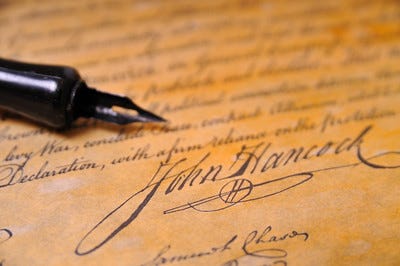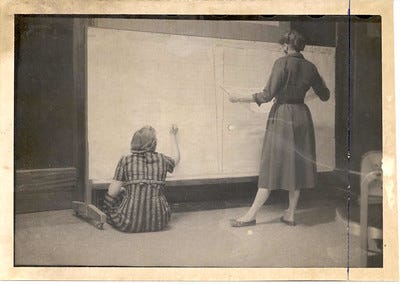Hitting Pay Dirt
A little over year ago, I hit “pay dirt” when I realized that worldview is the “thing” that helps us make sense of the world and our proper place in it. As I dug deeper and deeper and deeper into this new concept (new to me anyway), the ways I understood my life - present, past, and future - began to change so quickly and dramatically I was thrown off balance. Interestingly, it was during this discovery process and balancing act that I learned worldview wasn’t just about us as individuals, it’s about all of us together, as a society. It was about every square inch of society, including culture, norms, families, education, religion, government, law (especially law), history, economics, and on and on and on.
It was mind blowing!
Because I’ve lived fully and unreservedly according to different sets of values over the course of my life, I can swim in various “worldview” seas with more comfort and familiarity than those who’ve escaped the see-saw life of shifting values. My journey into worldview has also given me tools to untangle some of the “over-complexity” of my life and to discern why certain things needed to happen, and to happen when they happened. Most importantly, it’s helped me understand much more about the world, our country, and, in particular, American culture. It’s also helped me understand the contours of the culture wars more intimately than before.
But it’s taken a while before I could figure out how to explain it all in a sensical way that didn’t look like a Jackson Pollock painting. I think I’m there, or at least close to “there,” so let’s give it a whirl.
Writing on Worldview
When my husband writes a book, he starts in the middle and works his way forwards and backwards until it’s done. This keeps his writing focused on the core thesis of his work instead of running down too many rabbit holes or waiting too long to get to the point. Having a consistent through-line makes any book more “readable,” and his books, although covering complex topics, are no exception.
As I’ve been distilling the vast land of worldview, I, too, have been searching for the middle, or the starting point, so to speak; to say it a different way, I’ve been searching for the fulcrum on which everything else pivots. So, whether I’m writing forwards or backwards, the reader will never be too far from “home base.”
The Foundational Assumption is the Fulcrum
Everything everyone says or believes rests on an underlying assumption, or set of assumptions, even though most of us aren’t conscious of it. Given our lack of self-awareness, and, for that matter, others-awareness, vis-a-vis assumptions, we spend most of our time talking past each other, getting more and more frustrated by the minute. I believe this is the primary reason we fight so inelegantly and cancel each other without much consideration. Unless we slow down long enough to understand the fundamental assumptions upon which our respective positions rest, we’ll have a hard time exchanging views without exchanging blows. Current situation is America is Exhibit A.
Let’s look at some examples:
Most of us believe in human rights, but we don’t agree on who counts as a human for purposes of receiving them, or who’s responsible for protecting them from encroachment by others.
Most of us believe in social justice, but we don’t agree on what social justice is or an acceptable way (or ways) for achieving it.
Most of us believe the climate is changing, but we don’t agree on why it’s changing, or how best to solve the problem, or even if it’s a problem.
Most of us believe that atrocities should be absolutely be condemned in the strongest way possible, but we don’t agree on the nature or scope of that condemnation, or how to avoid atrocities from recurring in the future.
And so on and so forth …
Is this a right v. wrong battle, or a worldview v. worldview battle?
We Have So Much in Common, Right?
We’ve all heard the refrain—we have so much more in common than that which divides us—especially during election cycles, but no one really elaborates on what those commonalties are.
Does this refrain rest of the assumption that because we’re all Americans, we share a common history, a common story, and a common understanding of life, liberty, and the pursuit of happiness? If so, what is that history, story, and understanding? If you seek answers from 10 different people, you’ll likely get 10 very different answers.
And therein lies the problem.
Every presidential nominee, at least in recent memory, promises to unify the country and be the president for “all” Americans, yet half the country doesn’t buy it and/or isn’t interested in that candidate’s vision of unity.
Why is that?
Why are we so divided?
We’re not just divided, but we’re irreconcilably divided, because Americans no longer share a common worldview, not just for ourselves, but for our nation. We no longer agree on the most fundamental axioms or self-evident truths upon which this country was founded. Indeed, half of us no longer believe in, or even accept the validity of, these axioms or self-evident truths.
Think of it this way.
When two reasonable normies like you and me are presented with the same exact story with the same exact facts (abortion, IVF, immigration, energy, inflation, etc.) but respond to it in totally opposite ways, the only thing we agree on is the fact that we don’t share the same worldview.
We view things through very different, and very incompatible, lenses.
Let’s explore this in the context of the American founding.
Is there an American Worldview?
Below is the second paragraph of the Declaration of Independence.
In Congress, July 4, 1776
We hold these truths to be self-evident, that all men are created equal, that they are endowed by their creator with certain unalienable rights, that among these are life, liberty and the pursuit of happiness.—That to secure these rights, governments are instituted among men, deriving their just powers from the consent of the governed,—That whenever any form of government becomes destructive of these ends, it is the right of the people to alter or to abolish it, and to institute new government, laying its foundation on such principles and organizing its powers in such form, as to them shall seem most likely to effect their safety and happiness.
The United States of America was founded upon the axiomatic, self-evident truth that all men are created, and that all men are created equal. Therefore, all men have a Creator.
SIDEBAR » The masculine “man” or “men” or “he/him” was used to refer to all humans at the time the Declaration was written (and really until 20 years ago or so), so any gendered criticism is a red herring.
Unfortunately, we tend to put all of our focus on the term “equal,” without regard for the prefatory term “created,” and then challenge its legitimacy because not all men are “treated equal.” but that’s a dishonest reading of the text.
By focusing on the adverb “equal” to the exclusion of the verb “created,” we dismiss the contextual meaning of “equal” and replace it with our preferred understanding of “equal.” We must pay particular attention to the verb that “equal” modifies: “created”.
In the Declaration of Independence, “equal” modifies “created.” The verb “treated” doesn’t appear in the text, nor is it discernable from a careful reading of the text. As such, assuming that “creating something” and “treating something” are equivalents is misguided. I would argue that the way one “treats” something depends on how that something was “created.” The intrinsic value of the something lies not in its treatment, but in the manner in which the something came into being. Whether the “treatment” is equal or unequal, fair or unfair, good or bad, wholly depends upon the objective and/or subjective “value” of the object of the treatment: Are we talking a stink bug or your neighbor?
All Men Are Created and All Men Have a Creator
I’ve previously written about the three fundamental worldviews:
theism
pantheism
naturalism
What does this have to do with the Declaration of Independence?
Everything.
Theism presupposes a supernatural moral Creator who is separate and distinct from his creation. In this view, the Creator himself is not a created being. Rather, he sits outside of time and space.
Pantheism presupposes that man is god and god is man, so man is both the Creator and the created, they are inseparable. In this view, there is no supernatural or moral Creator.
Naturalism denies the existence of any Creator at all. In this view, every force and every law operating in the world is natural. Nothing is designed, nothing is created, it just is. To put a finer point on it, the world and everything in it is uncreated.
Back to the Declaration …
The Declaration of Independence establishes the fundamental assumptions, or axioms, upon which the country was founded. From paragraph 2 …
We hold these truths to be self-evident, that all men are created equal, that they are endowed by their creator with certain unalienable rights, that among these are life, liberty and the pursuit of happiness.—That to secure these rights, governments are instituted among men, deriving their just powers from the consent of the governed,—
Humans are created by a Creator who is separate and distinct from the creation.
Humans are created the same, or equal, meaning one isn’t more valuable than another.
Unalienable, pre-political, human rights derive from the Creator, not from men, nor governments, nor any other polity.
The sole purpose of human government is to secure these Creator-endowed rights to the people.
Given the self-evident truths outlined in the Declaration, it shouldn’t come as a surprise to anyone that America was founded upon the axioms truths of the theistic worldview. Not all of the founders were Christians, but all agreed upon the existence of a Creator, external to his creation. As many know, the continuing role of the Creator after creation was (and still is) a common topic of debate, but’s that not salient to the broader worldview at issue. But make no mistake, the theistic worldview has massive implications for everyone and everything, including humanity’s right relationship with and to the created world.
Consider, for example, the source/s of intrinsic human dignity, objective human value, and by extension, inalienable human rights, things we all claim to appreciate and respect.
Do they come from the Creator?
Or from the created?
Or from the uncreated?
If you think about it, there isn’t any issue, on any topic, in any sphere of life that isn’t rooted in a worldview that begins with:
In the beginning, God …, or
In the beginning, a spec of matter …
While America wasn’t founded as a Christian nation - it isn’t a theocracy no matter how many times the media claims it is - it was founded upon the worldview that says, In the beginning, God … There isn’t anything ambiguous, mysterious, or difficult to understand about this reality.
The entire American experiment presupposes a theistic worldview that acknowledges the existence, morality, and authority of a supernatural Creator. This worldview informs our understanding of humanity, including where we came from and where we’re headed, the proper role of government in human life, and the ethical norms required for human flourishing.
No American citizen is required to share in this worldview or any resulting belief systems (Judaism, Christianity, and Islam operate within the theistic worldview), and no one can compel them to change their mind of any of it, and specifically NOT the government.
But every American citizen does have to pledge their allegiance to the place they call home in exchange for continued receipt of the benefits of citizenship.
There are MANY patriotic Americans who don’t believe in a Creator, or in a created world, but their personal beliefs don’t change the reality that the American experiment presupposes both. Nor do they change the fact that removing, discrediting, or simply disregarding this undergirding worldview renders America a moot point. The American nation no longer makes much sense and the experiment in political liberty is over. Our own history has borne this out time and again. We’re pretty close to curtains on our Constitutional Republic (being replaced by a Progressive Administrative State), but the fat lady hasn’t sung yet. She’s still warming up!
Which leads me to the obvious question:
Does America always live up to the standards established by a theistic worldview?
Of course not.
And I don’t know anyone who claims otherwise.
No one, not one person, is perfect or without error (why that’s the case is a topic for another day).
But the fact remains that the theistic worldview, and the theistic worldview only, is the only worldview that provides the framework for fixing what’s broken, righting what’s wrong, and restoring what’s been lost. My next several posts will focus on explaining this precise point.
Back to Writing About Worldview
As mentioned above, Americans are irreconcilably divided not because we have a handful of political disagreements or conflicting views over various policies, Americans are irreconcilably divided because we no longer share a common worldview.
We no longer agree on the most fundamental truths upon which this country was founded (or even how the world and humanity came to be). Indeed, roughly half of us no longer believe in, or even accept as valid, these fundamental truths. As a result, many of us no longer believe America is a good or decent country. Cue the critical social theories.
Back to the beginning …
If we stay in the “pay dirt” and start with the assumption “In the beginning, God …" on the one hand, and with the assumption “In the beginning, a spec of matter …” on the other, we’ll get a grip on why we think the way we do, why we fight the way we do, and why we can’t just get along already.
Our ability to live happy and productive lives and to return to a country that protects the blessings of liberty literally depends on it.
I’ll be back shortly with a story about my first bona fide confrontation with the battle for the beginning-that evolution / creation thing-and the implications of it for us today.
Thank you, as always, for reading and supporting my work.
In service to the truth, the whole truth, and nothing but the truth!
xo,
Kelley
September 27, 2024










Thank you, Kelley! Thoughtful as always. Excellent writing and presentation. America does have a 'worldview,' but many want to change it to something that fits better with their 'worldview.' Before changing, I think it's a good idea to ask and answer some serious questions about where a new worldview comes from and where it would take us as a nation. Is there something wrong with our country's founding worldview? If so, what and why? The 'founders' of our country gave citizens a mechanism to 'change' or 'update' the founding documents. The framers of the U.S. Constitution were not unaware that the future needs of the young nation might benefit from 'change,' so they included a 'pathway' to change via Article V. It allows for a nation with 'divided worldviews' to come together to discuss and vote on changes and additions. You might say that our Constitution is 'worldview flexible.' The bar for amending the Constitution is a high, as it should be, but it is a sensical way of keeping our country protected and on course forward to what is 'best' for the population.
Hundreds of thousands of bills to 'amend' the Constitution have been presented during our nation's history, but only 27 of them have attained the title of 'Amendment.' If people truly want to 'save our democracy' (even though we are a constitutional republic), they would use the tools the founders of our great nation afforded them in the 18th century. There is no need to resort to violence based on differing worldviews, if we truly believe in 'democracy.' Simply go through the process afforded every citizen, every state legislature, and Congress. Article V of the U.S. Constitution. It provides a legal path forward for all of us.
Again, thank you for a wonderful article!!